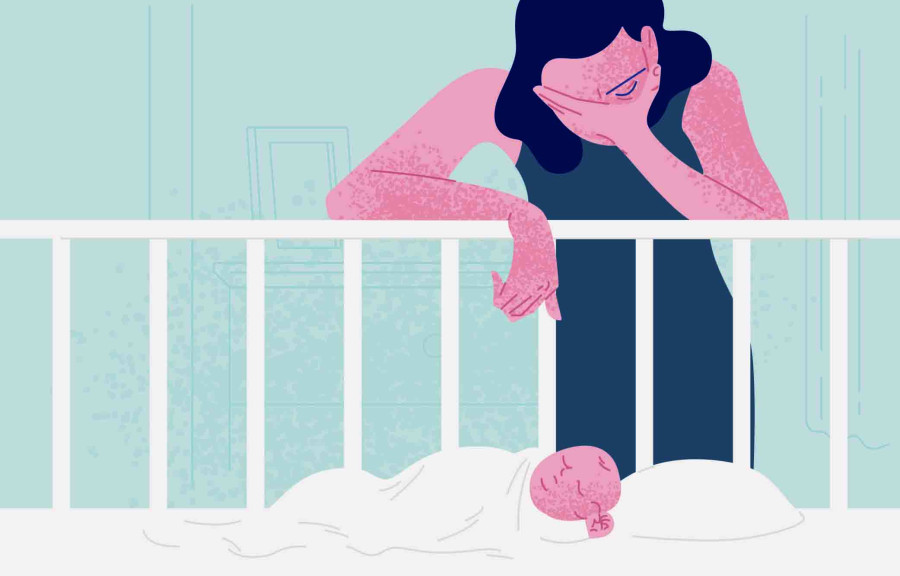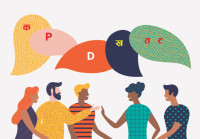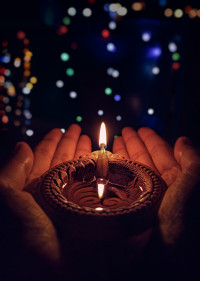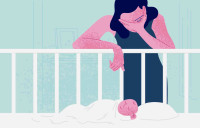As it is
Mental health of new mothers during the pandemic
The mental well-being of new mothers is often overlooked and rarely taken into consideration.
Heema Rai
Three days after I gave birth this March, my cousin called to see how I was doing. She was the first to check up on me. She also happened to be one of the few people I knew who openly talked about postpartum depression (PPD). Not long after she gave birth to her child, she started becoming haunted by the thought of her baby not being her own. This unrelenting, intrusive thought caused her immense pain, and it constantly left her racked with ‘mom guilt’. Only years later did she realise that it was a clinical issue and not a problem she could grapple with alone; she had PPD. Since PPD is an experience women commonly endure, she called to check if I was going through what she did. On that day, however, I was doing fairly alright.
Those incomprehensible emotions that are triggered by PPD struck me a week after. One evening as we were massaging the baby, it suddenly dawned on me that I was responsible for protecting this new life. Although it seemed like an obvious statement, being hyper-aware of that fact overwhelmed me. I couldn't believe I had brought a tiny defenceless human into this world—a place, I felt, replete with chaos and madness.
Multiple layers of emotions began flooding in; sadness, love, regret, ecstasy, fear, and anxiety, all at once. I felt so buried in those feelings that tears started streaming down my face. Over the next month, I weathered the storm that accompanied PPD and was persistently on this emotional rollercoaster ride. I was happy and elated one moment, anxious and guilty the next.
I was well aware that this was the result of hormonal imbalance, yet I couldn't rein in my emotions. I opened up to my husband about what I was dealing with; it kept me calm, grounded, and our conversations immediately turned into a form of coping mechanism. Soon after, it seemed as though I was able to curb my ‘baby blues’. But then came the second wave of Covid-19. The speed with which the pandemic ravaged the country’s health system caught us all off guard. This time around, the emotional blues returned menacingly. I began ‘catastrophising’—a term in pop psychology—and started welling up again. I was inundated with mental images of losing myself and my loved ones to the virus, and therefore never getting to know my baby, or her being afflicted by the virus: these brutal pictures were playing on loop in my mind. Just looking at my baby was enough to trigger these awful mental scenarios. It didn't help that many of my near and dear ones were either quarantined due to Covid-19 and bedridden in hospitals.
For over a week, I became the most anxious, frightened, and high-strung I had ever been. For someone as prudent and equanimous as I was, even under pressure, I could now no longer recognise myself.
After a few days of this hyper-panic mode, I gradually regained my composure and was able to think more rationally. That is when I discovered that I had postpartum anxiety (PPA). Almost 80 percent of new mothers experience ‘baby blues’ during the initial postpartum phase. PPD or PPA is a more persistent form that lasts even longer. In the USA, according to the Center for Disease Control (CDC), about 1 in every 8 mothers experience PPD. In Nepal, studies show that anywhere between 12-33 percent of new mothers suffer from it.
It was a relief to obtain clarity in what I was going through. But it was also a little frightening because seeking treatment for mental health in Nepal is still a unique challenge. And the lockdown made it tougher. So, I formed my own game plan to try and help myself. Through internet research, I found out that most treatments involved therapy and medication. Venting my emotions out by talking to people was also recommended along with exercise, meditation, and mindfulness exercises.
I began connecting more with friends and family over video calls. I participated in a fundraising effort for Covid-19 relief. I also started helping my village hospital to combat challenges posed by the pandemic. These interventions offered me a clear sense of purpose. And I wore my husband's ears off narrating what was going on in my head— the only form of ‘therapy’ I could muster up at the time.
Hiking or walking outdoors was impossible, so I started making rounds of my own house. These helped me immensely. My anxiety has not been resolved by any means, but I have learned to manage it well enough. What helped me the most was my husband's support. I could share things with him candidly to my heart's content.
I began to wonder how other new mothers were coping. Not everyone has the listening ear of their loved ones. Many are unable to afford the necessary space and time required for their mental healing, as they juggle multiple duties within their household.
The world has taken a tailspin, with regards to mental health, these past two years. Nepal is no exception. It's even worse here because mental health is blatantly neglected. The ongoing pandemic has added so much anxiety, grief, and trauma onto our lives. When these overlap with PPD, the situation becomes very grim for new mothers. Their family and friends are not there to help them out physically, or even distract them when need be. During virtual conversations, the subject invariably steers towards the baby, the mother’s diet, or whether the mother is lactating properly. The mental well-being of new mothers are often overlooked and rarely taken into consideration. Even the most supportive and well-meaning people are often unaware of how emotionally taxing the postpartum phase can be. I am sure there are thousands of new mothers who put on a cheerful mask but are having a hard time coping on the inside. Because of PPD, some new mothers have even committed suicide along with their children—marriages have fallen apart, and in some instances, the mothers have left their children.
It is therefore imperative that we check up on each other every once in a while, even if things seem normal. But as a new mother during a pandemic, I would urge people to be more considerate towards new mothers. Even when new mothers are trying their best to stay resilient, the daily chaos of the world can exacerbate our anxieties, often leaving us fearful, over-protective of our children, and constantly on edge. The world has remotely seen a glimmer of normalcy these past two years, thus it is in these times that we must lend what little strength we can muster up, through acts of kindness, love, and compassion to each other. This is how I believe we can get through such a tentative period, one virtual hug at a time.




 15.95°C Kathmandu
15.95°C Kathmandu








.jpg&w=300&height=200)

